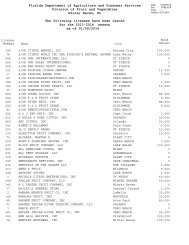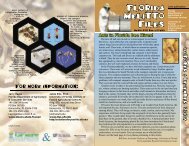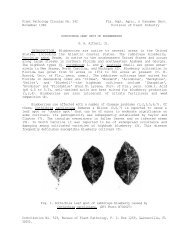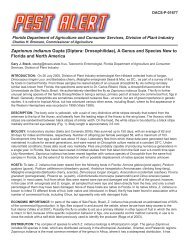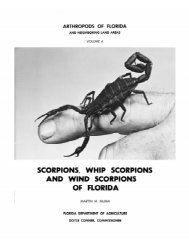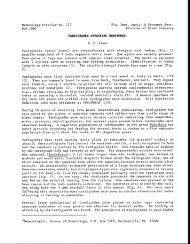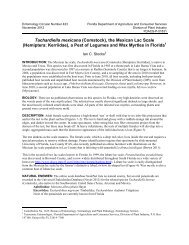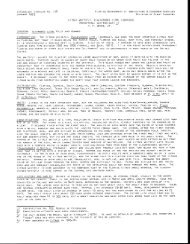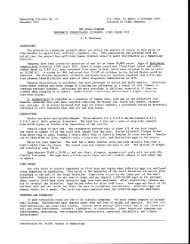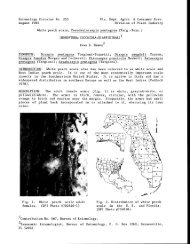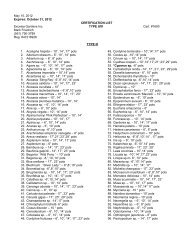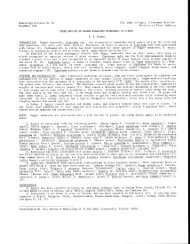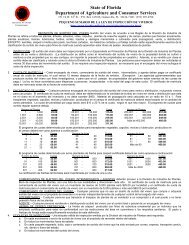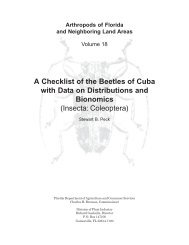Florida Melitto Files - Florida Department of Agriculture and ...
Florida Melitto Files - Florida Department of Agriculture and ...
Florida Melitto Files - Florida Department of Agriculture and ...
Create successful ePaper yourself
Turn your PDF publications into a flip-book with our unique Google optimized e-Paper software.
FDACS/DPI<br />
FROM THE DESK OF JERRY HAYES FROM THE DESK OF DR. JAMIE ELLIS<br />
In August, I represented the <strong>Florida</strong> <strong>Department</strong> <strong>of</strong><br />
<strong>Agriculture</strong> & Consumer Services, Division <strong>of</strong> Plant<br />
Industry’s apiary section at the North Central (NC) 508<br />
meeting titled, “Sustainable Solutions to Problems Affecting<br />
Honey Bee Health.” There were 25 attendees representing<br />
University Extension; USDA Cooperative State Research,<br />
Education, <strong>and</strong> Extension Service; American Association<br />
<strong>of</strong> Pr<strong>of</strong>essional Apiculturalist; <strong>and</strong>, Apiary Inspectors <strong>of</strong><br />
America. The meeting was designed to share, discuss <strong>and</strong><br />
formalize committee mechanisms for collaborative research<br />
Jerry Hayes, FDACS/DPI <strong>and</strong> funding possibilities to address honey bee health issues<br />
Asst. Chief Apiary Inspection <strong>and</strong> challenges.<br />
Public awareness has been suffi ciently raised, <strong>and</strong> the<br />
government’s attention is focused as at no other time on the devastating loss <strong>of</strong><br />
honey bees <strong>and</strong> other pollinators from the environment. Colony Collapse Disorder<br />
has been the riveting force for global recognition that honey bees are the vital link<br />
in production agriculture <strong>and</strong> the general health <strong>of</strong> the environment. Couple this<br />
raised awareness with the tremendous interest, support <strong>and</strong> political strength from<br />
other pollinator groups such as North American Pollinator Protection Campaign,<br />
Co-Evolution Institute, Monarch Watch, <strong>and</strong> the media, <strong>and</strong> you’ll see it has led to<br />
Congress stepping up to the plate to respond to the public’s dem<strong>and</strong> for a solution.<br />
There is a strong possibility that there will be funding made available through<br />
several pathways such as the Cooperative Agricultural Pest Survey, National<br />
Research Institute, 406 Programs, <strong>and</strong> others. The NC 508 group is preparing to<br />
access funding that becomes available to begin research in honey bee health.<br />
DPI, while not representing pure research or extension activities, was invited<br />
to participate in this meeting as a partner <strong>and</strong> part <strong>of</strong> this community. For any<br />
substantive research to be conducted, fi eld surveys will have to be performed.<br />
Beekeepers <strong>and</strong> apiaries will have to be identifi ed <strong>and</strong> located. Samples will have to<br />
be collected <strong>and</strong> assessments made. DPI’s apiary section was included in this seminal<br />
meeting in hopes that we would consider joining the collaborative effort if <strong>and</strong> when<br />
needed. Honey bee health <strong>and</strong> the health <strong>and</strong> vitality <strong>of</strong> our apiculture industry are<br />
the goals <strong>of</strong> all <strong>of</strong> us regardless <strong>of</strong> what “<strong>of</strong>fi cial” function we provide <strong>and</strong> who we<br />
serve. DPI was at the table, visible <strong>and</strong> willing to respond <strong>and</strong> be responsive within<br />
this community. We will have to see how this evolves, but I appreciate your support<br />
in extending the stride <strong>of</strong> DPI’s apiary section as we work with our colleagues in<br />
research <strong>and</strong> extension in other parts <strong>of</strong> the nation.<br />
The FDACS’ Division <strong>of</strong> Marketing, Bureau <strong>of</strong> Education <strong>and</strong> Communication<br />
has produced a high quality DVD, “Africanized Bees in <strong>Florida</strong>: Coping With The<br />
Challenge.” If you would like to share this video with your local media, please<br />
contact me by e-mail at hayesg@doacs.state.fl .us or phone me at (352) 372-3505 ext<br />
128 to request a copy.<br />
Greetings <strong>Florida</strong> Beekeepers! I hope that the summer<br />
beekeeping season treated you well <strong>and</strong> that your colonies<br />
are strong <strong>and</strong> healthy. My students, technicians, <strong>and</strong> I<br />
remain busy with our research, extension, <strong>and</strong> instruction<br />
efforts. I look forward to discussing our progress with you at<br />
the fall meeting <strong>of</strong> the <strong>Florida</strong> State Beekeepers Association<br />
(see special FSBA insert).<br />
I want to use this quarter’s column to give you a sneak<br />
preview <strong>of</strong> the <strong>Florida</strong> Master Beekeeper Program. Jerry<br />
Hayes (FDACS-DPI), Ray Zerba (extension agent, Clay<br />
Dr. Jamie Ellis<br />
County), Tom Donovan (extension agent, St. Johns County),<br />
UF Asst. Pr<strong>of</strong>essor<br />
Am<strong>and</strong>a Ellis (FDACS-DPI), Bill Kern (UF-IFAS), <strong>and</strong> I<br />
have met <strong>and</strong> designed what we believe to be the best Master Beekeeper Program<br />
<strong>of</strong>fered anywhere in the country. There is not enough space to discuss the program in<br />
detail here, but I plan to “unveil” the program in its entirety at the upcoming FSBA<br />
meeting in Winter Haven (you MUST attend this sure-to-be-great event!). Just to<br />
whet your appetite, I’ll give you a few <strong>of</strong> the highlights now.<br />
The <strong>Florida</strong> Master Beekeeper Program will be composed <strong>of</strong> 4 levels:<br />
Apprentice Beekeeper (participant has general knowledge <strong>of</strong> honey bees <strong>and</strong> beekeeping)<br />
Advanced Beekeeper (participant has advanced knowledge <strong>of</strong> beekeeping, honey bee<br />
biology, <strong>and</strong> other special topics)<br />
Master Beekeeper (participant chooses a “major” <strong>and</strong> demonstrates expertise in that major<br />
<strong>and</strong> in other specialized beekeeping topics)<br />
Master Craftsman Beekeeper (highest level in the program – the participant accrues public<br />
service credits, conducts a University-led research or extension project, <strong>and</strong> passes a series<br />
<strong>of</strong> challenging examinations)<br />
The program is designed to challenge beekeepers to become masters <strong>of</strong> their craft.<br />
The program usually takes 4+ years to complete. Achieving the Master Craftsman<br />
level is the non-academic equivalent to being awarded a masters degree in apiculture<br />
from any U.S. university. Although designed to train <strong>and</strong> challenge beekeepers, the<br />
program is also intended to facilitate the transfer <strong>of</strong> “bee-knowledge” to the general<br />
public through the efforts <strong>of</strong> program participants. I consider this a win-win.<br />
I realize that this is simply a snippet <strong>of</strong> information concerning the program.<br />
However, I plan to discuss the program in detail at the FSBA meeting in Winter<br />
Haven. Also, a website will be constructed for the program, <strong>and</strong> I hope to include the<br />
web address in the Jan – March issue <strong>of</strong> the <strong>Melitto</strong> <strong>Files</strong>. If you have questions<br />
about the program, contact me.<br />
I’ve got more good news - my colleagues <strong>and</strong> I are planning a University <strong>of</strong><br />
<strong>Florida</strong> Honey Bee College. Plans for this program are in the works. However, we<br />
intend to hold the event sometime in March <strong>of</strong> 2008. So begin making plans to attend<br />
this meeting now! The Master Beekeeper Program will <strong>of</strong>fi cially begin at the spring<br />
short course. The next issue <strong>of</strong> the <strong>Melitto</strong> <strong>Files</strong> will have more details. I hope<br />
that your fall beekeeping endeavors are fun <strong>and</strong> pr<strong>of</strong>i table.<br />
<strong>Florida</strong> <strong>Melitto</strong> <strong>Files</strong> ... News for Bee Lovers October - December 2007<br />
UF/IFAS



